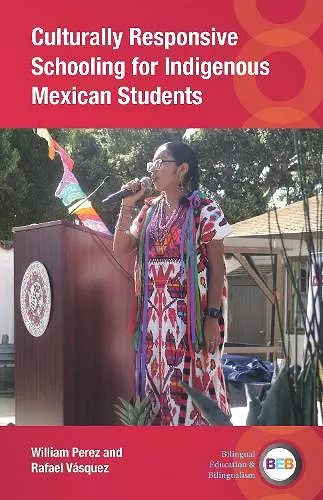Culturally Responsive Schooling for Indigenous Mexican Students
William Perez author Rafael Vásquez author
Format:Paperback
Publisher:Multilingual Matters
Published:12th Mar '24
Should be back in stock very soon
This paperback is available in another edition too:
- Hardback£114.95(9781800417533)

The first examination of the sociolinguistic, identity, and educational experiences of Indigenous Mexican youths
This book uncovers the social and educational experiences of young Indigenous immigrants in the US. Highlighting the multilingual and multicultural diversity of Latin American immigrants, it explores how policymakers and educators can effectively support Indigenous students’ multilingualism, ethnic identity development and educational success.
This book uncovers the social and educational experiences of an increasing yet understudied population of young immigrants in the US, focusing on multilingual students who speak one of three Indigenous languages: Zapotec, Mixtec and P’urhépecha. It explores students’ ethnoracial identities, Indigenous language use and transnational practices and the influence of these factors on school adjustment, academic achievement and educational pathways. This three-year mixed-methods study in semi-urban, urban and rural contexts assesses student interviews, teacher interviews and survey data to provide an account of how Indigenous students develop their social identities and examines the influence of their non-Indigenous Mexican peers and teachers. It highlights new developments in Latinx cultural and linguistic heterogeneity and intragroup race/ethnic relations, informing policymakers and educators about Indigenous immigrant students and how to effectively support their multilingualism, ethnic identity development and educational success. It will be of interest to researchers working in related fields such as education, Latin American studies and immigration studies.
‘They don’t understand us.’ This should be a subtitle to this important contribution. This volume is a must read for all present and future educators in California and any educator that is involved with indigenous students throughout the Americas. The qualitative/personal experience divulged by students is enlightening, sometimes educationally embarrassing for our profession, but, at the same time highly informative for any of us who care about educational equity.
* Eugene E. Garcia, Professor Emeritus, University of California, Berkeley and Arizona State University, USA *Culturally Responsive Schooling for Indigenous Mexican Students provides important insights into how these youth must navigate not just the typical challenges of (im)migration, but also deep-seated anti-indigeneity and linguicism both in Mexico and in the U.S. This meticulously researched and compellingly written book is a welcome and important contribution to multiple disciplines. * Carola Suárez-Orozco, Harvard Graduate School of Education, USA *
In our contemporary and complex socio-political-historical contexts of both hope and contestation, Perez and Vásquez have provided practitioners, scholars and policymakers with profound, rich and authentic translingual, transcultural and transborder perspectives from and about Zapotec, Mixtec, and P’urhépecha youth. This book is certain to become a seminal resource for decades to come.
* Magaly Lavadenz, Loyola Marymount University, USA *Culturally Responsive Schooling for Indigenous Mexican Students is a valuable contribution to the field of education, and it is a must-read for educators in California and any educator in other contexts involved with Indigenous students. The book can serve as a tool to correct monocultural and monolingual misconceptions about Mexican immigrants. It can also serve as a foundation for understanding transcultural, translingual, and transnational identities [...] It is an essential read for educators, policymakers, and researchers dedicated to advancing diversity and inclusion in education.
* Irasema Mora-Pablo, University of Guanajuato, Mexico, Journal of Education for Multilingualism, 2024 *The most pertinent issue raised in Perez and Vásquez’s book relates to bilingual and ESL teachers’ unawareness of Indigenous students’ emerging trilingualism as well as not understanding the cognitive shift some Indigenous students face when coming from an oral culture into a written culture. Therefore, this book is highly recommended for study in teacher education programs – especially in bilingual education programs – as well as for Indigenous studies, Latinx studies, and immigration studies programs.
* Mariarlett Villalobos, The University of Texas at El Paso, USA *Perez and Vásquez offer a detailed two-year study that combines quantitative and qualitative data, which will enable readers to gain insights into how these youths cope with the big challenges of immigration, anti-indigeneity and linguicism. Written in a friendly style, the book includes illustrative maps, examples, and a final glossary that complements and enriches the exposition [...] they examine in-depth cases that feature students’ voices through compelling narratives of need and struggle, and enumerate some positive experiences from previous studies, which will inspire practitioners and administrators.
* Laura Dubcovsky, LINGUIST List 35.24ISBN: 9781800417526
Dimensions: 234mm x 156mm x 10mm
Weight: 270g
192 pages